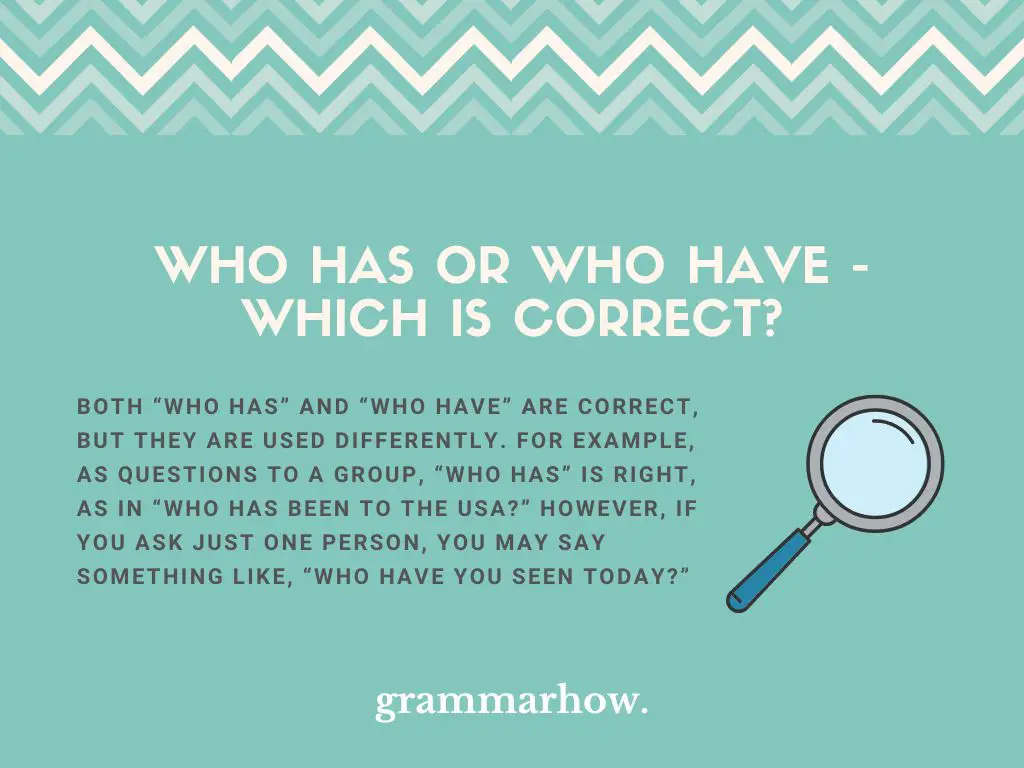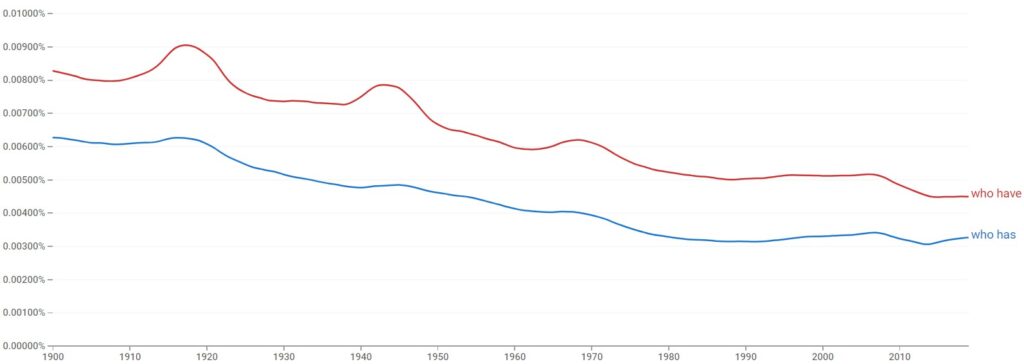The terms “who has” and “who have” can be highly confusing for English learners to get right. This article takes a look at how to use “who has” and “who have” in a sentence and explains the differences between the terms.
Who Has or Who Have – Which Is Correct?
Both “who has” and “who have” are correct, but they are used differently. For example, as questions to a group, “who has” is right, as in “who has been to the USA?” However, if you ask just one person, you may say something like, “who have you seen today?”

The terms “who has” and “who have” function slightly differently, and it can be confusing to know when to use “has” or “have.” The following rules are general guidelines, and there may be some exceptions, but on the whole, this is how it works.
For questions
For questions to a group of people, “who has” is the correct option because you are essentially asking “which individuals” from the group have or have not done something.
- Who has been to Spain?
- Who has eaten lunch already?
- Who has their book with them?
For questions directed at one person, it is far more likely you will use “who have” because you are essentially asking “which people or person have you…”
- Who have you been talking to?
- Who have you seen this morning?
- Who have you told about the party this weekend?
When you are making statements, both positive and negative, it is more likely that “has” will be used for third person singular (he, she, it) and “have” for everything else.
- She is the girl who has been to New York three times.
- He is the one who has been calling me all week.
- We are the only ones who have completed the work on time.
- They are the people who have been a great support to me.
Who Has
The term “who has” is used in questions when addressing a group of people and finding out “who” has done something or been somewhere out of the individuals in the group.
When using the term in statements that are not questions, “who has” refers to singular third-person subjects like “he, she, and it.”
As shown in these examples:
Questions
- In this room, who has finished their homework? I have finished my homework / She has finished her homework.
- Who has seen the film, Batman? We have seen the film, Batman. / She hasn’t seen the film, Batman.
- Who has taken my pen? I haven’t taken your pen / I think she has taken your pen.
Statements
- Laura is the one who hasn’t done anything all day.
- That is the guy who has been asking me to go on a date all week.
- Sorry, but it is me who hasn’t done anything for the project.
Here are some more sentences with “who has” and the meanings of each:
- Everyone who has done their homework, please bring it to the front – Addressing a group of people and expecting more than one person to answer.
- Anyone who has done their homework, please bring it to the front – Addressing a group of people and expecting at least one person to answer.
- I want to find someone who has been to New York – Addressing a group of people and wants only one person/answer.
- Anybody who has a pen, please lend it to me – Addressing a group of people and wanting only one person/answer.
- It is you who has been absent all week, so you need to catch up. – Addressing one person.
- All who has – Incorrect
Who Have
The term “who have” is used either in questions directed at one person or statements to represent “I, they, we, and us.” When asking “which one” from a group, it is better to use “who has”.
Here are some examples to show “who have” in context:
Questions
- Who have you been talking to all day?
- Who have you been driving to work with?
- Who have you seen in concert?
Statements
- They are the ones who have been bullying me all week.
- We are the students who have produced the best project so far.
- It is Paula and Jim who have been sitting waiting for the printer for half an hour.
Here are the same sentences from the “who has” section. Where the same sentence can use the word “have”, it has been added:
- Everyone who have – Incorrect.
- Anyone who have – Incorrect
- Someone who have – Incorrect
- Anybody who have – incorrect
- It is you who have – Incorrect
- I want to thank all those who have attended. – Addressing multiple people
Which Is Used the Most?
The Google Ngram shows that “who have” has always been more common than “who has.”

But, interestingly, since the start of the 20th century, the use of both words has reduced considerably, perhaps because “who have” and “who has” often form part of relative clauses, which have possibly become less common as English has become less formal.
Final Thoughts
The terms “who have” and “who has” are similar but used differently. “Who has” refers to a group of people in questions and “he, she, it” in statements. In contrast, “who have” is used to question individuals or statements that use “I, we, us, them, they.”

Martin holds a Master’s degree in Finance and International Business. He has six years of experience in professional communication with clients, executives, and colleagues. Furthermore, he has teaching experience from Aarhus University. Martin has been featured as an expert in communication and teaching on Forbes and Shopify. Read more about Martin here.

